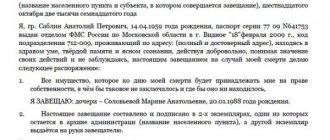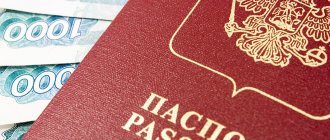To save relatives from bureaucratic procedures for dividing inherited property, many property owners prefer to formalize the transfer of rights to apartments, garages, land plots or houses in advance. The main problem in this case is the choice of the legal form of registration - a deed of gift or a will. There are pros and cons to each option.
Is it necessary to notarize a will?
Making a will allows a citizen to dispose of property in the event of his death. For this document to enter into legal force, it must be notarized . compose the text of the order yourself or provide it to a notary. However, in any case, the notary must check the legality of the will and register it in the prescribed manner, otherwise such a document will be invalid or may be challenged.
The role of a notary when certifying a will is to verify the following facts:
- Citizen's capacity.
- Voluntariness of the will (the will should not be drawn up under the influence of other persons).
- Correctness of indication of heirs' data, as well as property.
- Legality of signing a will - if a citizen is unable to sign the will on his own due to certain circumstances, then another citizen can do this in the presence of a notary.
- If the will is drawn up independently, the notary checks whether its conditions contradict the law or his own logic.
Information
The notary explains to the testator and witnesses about the need to maintain the secrecy of the will, as well as the provisions of the law regarding the rights to an obligatory share of the inheritance of other citizens established by law (Article 1149 of the Civil Code of the Russian Federation).
Gift deed and will - the main differences
What is the difference between a deed of gift and a will? Legally, both concepts imply the free transfer of ownership of any real estate to third parties. However, each option has its own characteristics. The main difference is the moment of transfer of ownership rights to the object:
- when registering a deed of gift, ownership of real estate begins at the moment of signing the donation agreement and after its corresponding registration;
- When drawing up a will, the heir gets the opportunity to personally dispose of the property only after six months from the death of the testator.
When choosing a method for transferring rights to an apartment or other real estate, you need to take into account other nuances - the cost and complexity of the registration procedure, taxation issues, and the possibility of canceling orders made.
How much does it cost to get a will from a notary?
A will has legal force only after it has been certified by a notary. This legal action is subject to a state duty, which is 100 rubles . The specified amount implies payment for checking the legality of the will and its registration in the register of inheritance cases .
Drawing up the text of the will is not included in the cost of paying the state duty , since the law does not oblige the notary to draw up the document itself. The testator can do this independently or with the help of a specialist. Based on this, the cost of notary services of a technical nature is set by notary offices independently, depending on the region. On average, the price for drawing up a will and consultation is 2,400 rubles .
There are two types of wills - open and closed. For certification of a closed will, the notary fee is set at 100 rubles . A closed will implies its announcement to the heirs no later than 15 days from the date of provision of the testator’s death certificate. For a notary performing such an action, the Tax Code establishes a state duty of 300 rubles .
The law provides for the possibility of canceling or changing the terms of a previously written will. The testator can do this by drawing up a new order or document that will change or cancel some clauses of the previous will. can also be made to revoke the will . For all the above actions you will be paid:
- the state duty for certifying a will is 100 rubles ;
- the amount for technical work is on average 500 rubles (depending on the region).
Cost of registering a will for an apartment in 2021
The fee for certifying a will for any property is the same and amounts to 100 rubles, since the cost of the will does not depend on the type of inherited property. However, to register an inheritance of an apartment, you need to incur some expenses. It is not necessary to do this; you can simply indicate in the will the address of the object . However, in order to avoid problems when heirs receive property, it is worth providing the notary with all documents for the property.
For your information
To do this, you need to obtain an extract from the Unified State Register of Real Estate rights. Since the statement is valid for 30 days, most likely the testator will have to make a new one. In 2021, the cost of receiving it is 300 rubles .
Also, if the inherited property is jointly owned , for example, with a spouse, and the testator is going to transfer the apartment to a third party , then it is better to draw up an agreement on the allocation of shares . This is worth doing, because when accepting the inheritance, the spouse will have the right to half the share of the apartment by law , because is the owner. However, in court, she can increase her share if she proves that significant improvements were made to the housing at her expense. To avoid such disagreements between the heirs , the testator and the spouse can draw up an agreement to determine the shares with a notary. The average price of such an agreement is:
- 500 rubles - for certifying the agreement;
- 5000 rubles - for drawing up a document.
How much does it cost to register a will for a house and land?
If the testator wishes to transfer a house with a land plot to his heirs, then it is necessary to indicate in the will the object of the transferred property with its characteristics. For this purpose, an extract from the Unified State Register for the house is provided, as well as an extract for the land plot .
If a citizen transfers by will a house on a plot of land or a separate plot that was acquired long ago and is not registered in the cadastral register , then it is better to register it properly in order to avoid future problems when registering such property by heirs.
Attention
To register a plot of land for cadastral registration, it must be surveyed. The cost of this service averages 10,000 rubles in the regions and depends on the location and size of the site. In large cities like Moscow or St. Petersburg, the cost will be about 30,000 rubles .
Cost of drawing up testamentary documents for other property
If real estate is transferred, the testator is obliged to contact a notary and pay the appropriate state fee. However, if the object of the inheritance is money , then you can transfer it to the legal successors using a testamentary disposition (Article 1128 of the Civil Code of the Russian Federation). Such a document is drawn up in the bank in which the testator's funds are stored. A testamentary disposition has the force of a will, and its preparation is not subject to any fees .
The remaining costs when registering an inheritance can only be incurred by the heirs of the property . A citizen has the right to dispose of the testator's property only after receiving a certificate of the right to inheritance . For the issuance of such a certificate, the legislation establishes a state duty, which is:
- 3% of the value of the property , but not more than 100,000 rubles - if the heir is close relatives (spouses, parents, children (also adopted children), brothers or sisters (including step-sisters);
- 6% of the value of the property , but not more than 1 million rubles - if the inheritance is accepted by other citizens.
How to draw up a will for an apartment?
Actual topic
A will for an apartment is a topic that sooner or later begins to worry all property owners. Find out how to correctly draw up a will in order to express your will as accurately as possible and deprive unwanted claimants of the inheritance of the opportunity to challenge it in our article.
The “ABC of Law” of the ConsultantPlus legal reference system provides up-to-date answers to everyday questions and describes the procedure with references to legislation.
You can dispose of an apartment in the event of death by making a will or concluding an inheritance agreement (Clause 1 of Article 1118 of the Civil Code of the Russian Federation). To bequeath an apartment, we recommend following the following algorithm.
Step 1: Make a will
A will can be made either by one citizen or by spouses who are married at the time of making the will (joint will of the spouses) (clause 4 of Article 1118 of the Civil Code of the Russian Federation). It should be taken into account that the joint will of the spouses loses force in the event of divorce or the marriage is declared invalid both before and after the death of one of the spouses (paragraph 3, paragraph 4, article 1118 of the Civil Code of the Russian Federation).
A will is made personally by the testator (spouses); making it through a representative is not allowed (clause 3 of Article 1118 of the Civil Code of the Russian Federation).
When drawing up a will, the testator has the right, in particular (Article 1116, paragraph 4 of Article 1118, paragraph 1 of Article 1119, Article 1120, paragraph 1 of Article 1122, paragraph 1 of Article 1134, paragraph 1 of Art. 1135, paragraphs 1, 2 of Article 1137, paragraph 1 of Article 1139 of the Civil Code of the Russian Federation; paragraphs 18, , , , , Methodological recommendations, approved by the Decision of the FNP Board dated 01-02.07.2004, Minutes No. 04 /04):
- bequeath an apartment belonging to him or an apartment that will be acquired by him in the future. When specifying a specific apartment, you should define it as precisely as possible in the will (for example, indicate the address, cadastral number), so that later there will be no difficulties with its interpretation. In a joint will, spouses have the right to bequeath both common property and the property of each of them;
- bequeath property to any persons, both included and not included in the circle of heirs by law, as well as determine their shares in the inheritance in any way (provided that the sum of the shares of the heirs does not exceed one) or not determine the shares;
- to disinherit one, several or all legal heirs. This can be done in one of the following ways: by making a special order about this in the will. An heir thus deprived of inheritance cannot by law be called upon to inherit, except in cases where he has the right to an obligatory share in the inheritance;
- by the testator distributing all property among other heirs. In this case, such an heir by law may be called upon to inherit, for example, if the heirs under the will do not accept the inheritance or refuse it;
The will is written in clear and understandable language, allowing you to clearly understand the will of the testator. A will is made in writing. However, it is not allowed to draw up a will using electronic or other technical means (clause 1 of Article 1124, clause 1 of Article 1125, Article 1132 of the Civil Code of the Russian Federation; clause 35 of the Methodological Recommendations).
In some cases, the will must be written by the testator in his own hand, for example, if it is made in emergency circumstances or is closed (clause 2 of Article 1126, clause 1 of Article 1129 of the Civil Code of the Russian Federation).
The will must be personally signed by the testator (by spouses - in case of a joint will) (clause 4 of article 1118, clause 3 of article 1125 of the Civil Code of the Russian Federation).
A will can be drawn up by recording by a notary the will of the testator ascertained by him (clause 36 of the Methodological Recommendations).
Please note: here we talked about the new procedure for obtaining property deductions. The right to deductions can now be claimed without submitting a 3-NDFL declaration and supporting documents.
Step 2. Invite (if necessary) witnesses, a handyman and (or) an interpreter
The subsequent notarization of the will may require the presence of certain persons.
Thus, if the testator is unable to sign the will himself due to illness, physical disability or illiteracy, at his request the will can be signed in the presence of a notary by another citizen (a witness).
If the testator does not speak the language in which notarial paperwork is carried out, and the notary does not speak the language of the testator, the presence of a translator is also necessary (clause 3 of Article 1125 of the Civil Code of the Russian Federation; clause 39 of the Methodological Recommendations).
The testator has the right to invite a witness to be present when drawing up the will (clause 4 of Article 1125 of the Civil Code of the Russian Federation).
If a will is made in emergency circumstances, when a citizen is in a situation that clearly threatens his life, it must be written and signed in the presence of two witnesses. Within a month after the cessation of emergency circumstances, such a will must be properly certified, otherwise it will lose force (clauses 1, 2 of Article 1129 of the Civil Code of the Russian Federation).
In addition, the presence of witnesses is necessary when transferring a closed will to a notary and in the case of a will equivalent to a notarized will (clause 3 of Article 1126, clause 2 of Article 1127 of the Civil Code of the Russian Federation).
It should be borne in mind that some citizens cannot act as a witness and executor, in particular the spouse of the testator when making a joint will of the spouses, the person in whose favor the will was drawn up or a testamentary refusal was made, as well as the children, parents and spouse of such a person (Clause 2 of Article 1124 of the Civil Code of the Russian Federation).
Step 3. Notarize the will
As a general rule, a will must be notarized. To certify a will, you can contact any notary, regardless of the place of residence of the testator, with an identification document. It is not required to present to the notary documents confirming the testator's ownership of the apartment (clause 1, article 1124 of the Civil Code of the Russian Federation; clause 9, Methodological Recommendations).
If a will is written down from the words of the testator by a notary, the text of such a will must be fully read by the testator in the presence of a notary before it is signed, and a joint will of the spouses written by one of the spouses must be read in the presence of a notary by the other spouse. If the testator cannot personally read the will, its text is read out to him by a notary, about which a corresponding inscription is made on the will indicating the reasons why the testator could not personally read the will (Clause 2 of Article 1125 of the Civil Code of the Russian Federation).
If a will is drawn up and certified in the presence of a witness, it must be signed by him and his full name must be indicated on the will. and the place of residence of the witness in accordance with the document proving his identity (clause 4 of Article 1125 of the Civil Code of the Russian Federation).
When certifying a joint will of spouses, a notary is obliged to video record the procedure for making such a will, if the spouses do not object to this (clause 5.1 of Article 1125 of the Civil Code of the Russian Federation).
The will indicates the place and date of its certification (except for a closed will) (clause 4 of Article 1124 of the Civil Code of the Russian Federation).
A closed will is handed over to a notary by the testator in a sealed envelope in the presence of two witnesses who put their signatures on the envelope. Such an envelope is sealed by a notary in another envelope, on which the notary makes an inscription with information about the testator, the place and date of acceptance of the closed will, as well as the full name. and the place of residence of each witness (clauses 1 - 3 of Article 1126 of the Civil Code of the Russian Federation).
For notarization of a will, a state fee is paid (or a notarial fee - when applying to a private notary) (Parts 1, 2, Article 22 of the Fundamentals of the Legislation of the Russian Federation on Notaries).
| Reference. Amount of state duty (tariff) The amount of the state fee (notary fee) for certification of wills and for accepting a closed will is 100 rubles. Preferential categories of citizens, in particular disabled people of groups I and II, disabled since childhood, pay a state fee of 50 rubles. (Clause 13, Clause 1, Article 333.24, Clause 2, Article 333.38 of the Tax Code of the Russian Federation). |
Also, when contacting a private notary, if necessary, legal and technical services are paid in accordance with the established tariffs (Parts 7, 8 of Article 22 of the Fundamentals of the Legislation of the Russian Federation on Notaries; Clause 17 of the Review, approved by the Presidium of the Supreme Court of the Russian Federation on June 30, 2021).
In established cases, it is allowed to certify a will instead of a notary by other persons, in particular by officials of consular offices of the Russian Federation (clause 1 of Article 1124, clause 7 of Article 1125 of the Civil Code of the Russian Federation; clause 1 of part 1 of article 26 of the Law of 07/05/2010 N 154-FZ).
In addition, the following are equated to notarized wills (Article 1127 of the Civil Code of the Russian Federation):
- wills of citizens undergoing treatment in hospitals, hospitals, other medical organizations in stationary conditions or living in homes for the elderly and disabled, certified by chief doctors, their deputies for medical affairs or doctors on duty of these organizations, as well as heads of hospitals, directors or chief doctors homes for the elderly and disabled;
- wills of citizens traveling on ships flying the State Flag of the Russian Federation, certified by the captains of these ships;
- wills of citizens on exploration, Arctic, Antarctic or other similar expeditions, certified by the heads of these expeditions, Russian Antarctic stations or seasonal field bases;
- wills of military personnel, and in the locations of military units where there are no notaries, also wills of civilians working in these units, members of their families and family members of military personnel, certified by the commanders of military units;
- wills of citizens in places of deprivation of liberty, certified by the heads of places of deprivation of liberty.
It should be noted that the joint will of the spouses cannot be certified in this manner (clause 5 of Article 1127 of the Civil Code of the Russian Federation).
The legal reference system ConsultantPlus provides up-to-date answers to everyday questions from the “ABC of Law” series, the procedure for action is prescribed, and there are links to legislation.
Electronic magazine "ABC of Law"
Watch a video on this topic on our YouTube channel
Calling a notary to your home to draw up a will - cost
If the testator is unable to independently contact the notary’s office due to his serious condition, then it is possible to call him to his home . The law does not establish the obligation of a notary to visit a home at the request of a person who is unable to move, so not all of them can provide such a service.
There is also no additional state duty for exit registration. Notaries who provide such a service independently set the cost of travel to a citizen. On average its price is:
- 5000 rubles - when visiting individuals;
- 2000 rubles - when visiting disabled people.
Important
According to Part 4 of Art. 1127 of the Civil Code of the Russian Federation, if a citizen is in a life-threatening situation, intends to make a will, and there are persons who have the right to certify it without a notary, then they are obliged to take all possible measures to invite a notary to the testator, if possible.
Comments
Tatiana Kuznetsova
Why is there a fee for a certificate from a psychiatrist for drawing up a will for a person over 70 years old? Is this legal?
Answer
Ramilya
Several years ago, my grandmother wrote a will that after her death, the apartment would belong to me, but the fact is that she constantly rewrites the will for different people (who she likes), how can you find out whether she wrote the will or not? Is it possible?
Answer
What documents are needed for registration?
After certification of the will, the testator keeps the original document, and a copy, without fail, remains with the notary. The notary is also obliged to enter an electronic image of the document into the unified notary information system. This service exists for registering a will and the possibility of its restoration in case of loss. And also, if the heirs do not know whether the will was drawn up and by which notary, then such information can be found out through any other notary using this register.
To register a will, you must provide the notary with the following package of documents:
- Identification document of the testator.
- Heirs data.
- Documents allowing the identification of bequeathed property.
To reduce the likelihood of challenging the will in the future, you can also provide a certificate of absence of mental illness . In some cases, the notary himself may require a certificate from a psychoneurological and drug addiction clinic if he doubts the sanity of the testator.
What is more profitable – a will or a deed of gift?
Will or deed of gift for an apartment – which is better for the owner to choose? The main criteria by which you can evaluate the way of disposing of your real estate are the timing, complexity of registration and its price.
Registration cost
The price of registration of a deed of gift depends on the value of the real estate being donated and the proximity of the relationship between the donor and the recipient. For close relatives it looks like this:
- for state registration of a self-drafted gift agreement, the fee will be 2,000 rubles;
- when drawing up a deed of gift through a notary, he will take 3,000 rubles. for services and a fee of 0.2% of the housing price, but not more than 50,000 rubles.
If the recipient is a distant relative or even a stranger, then the price of the issue changes:
- for real estate value up to 1 million – 3000 rubles. + 0.4% duty;
- at a cost of 1 to 10 million rubles. – 7000 rub. + 0.2% duty;
- at a cost above 10 million rubles. – 25,000 rub. + 0.1% duty (but not more than 100 thousand rubles).
In addition, when receiving real estate as a gift, the recipient is required to pay income tax (NDFL) in the amount of 13% of the value of the property received. In such a situation, only close relatives of the donor are exempt from taxation, which the law includes parents, grandparents, brothers or sisters, children, and grandchildren.
When drawing up a will, you will only have to pay for the fact that it has been certified by a notary - 100 rubles. and for the valuation of inherited property. The main expenses will arise only at the time of opening an inheritance case and receiving a document for the right of inheritance - from 0.3 to 0.6% of the value of the property.
Registration deadlines
The period for registering a gift agreement should not exceed 2 weeks. In rare cases, it will take a month to obtain a USRN certificate. It will take several hours for a notary to draw up a will.
However, if the object of the donation is only a share in an apartment or house, you will have to spend time allocating the owner’s share (room, utility premises) in physical terms. This is done through the court in order to subsequently protect the rights of other owners and avoid discrepancies when using joint property or its possible sale. After receiving the court certificate, you will have to re-register the property for each owner in Rosreestr.
Opportunity to change your mind
What is easier to cancel – a deed of gift or a will? In general, the legislation provides for the possibility of canceling the alienation of property, but this is not always easy to do.
The act of donation can only be canceled for serious reasons. Both the relatives of the donor and the donor himself can go to court in an attempt to invalidate the gift agreement. The main arguments are usually:
- incapacity of the property manager - he has a documented mental illness, drug or serious alcohol addiction;
- causing physical harm by the donor to the donor or his family members in order to eliminate it;
- the fact of concluding a gift agreement less than six months before the bankruptcy of the donor as an individual or individual entrepreneur - in this situation, both relatives and judicial authorities can challenge the gift deed.
A property owner can easily change his or her last will by simply rewriting the will. Unlike the situation with a gift agreement, this can be done as many times as you like without much time investment. As a result, after his death, the will with the most recent date of preparation will be recognized as legitimate.
As for the heirs in whose favor the property was assigned, they can only challenge the orders of the deceased through the court. If they do not belong to categories protected by law (disabled people, retired parents, children under 18 years of age), then the reasons for which the will can be revised will be:
- proven incapacity of the testator at the time of drawing up the order;
- the will itself is not written by the hand of the testator;
- the fact of forcing the testator to transfer property to specific persons has been proven;
- The text of the will contains clauses that contradict the law.








